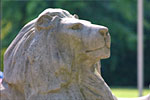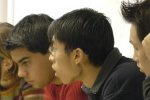Paul Bland
(Mechanical Engineering, 1992-2000)
Paul shares his memories and pictures of the Imperial Hockey Club and how Imperial has set him up for his future life in the East.
 What has Imperial’s role been in influencing world affairs over the last hundred years? Well, thankfully I am not going to try to answer that one, but perhaps the Centenary celebration year and events would be a time to reflect on some possible answers, and to check on Imperial’s direction for the future. (photo right: Mixed hockey tour to Worthing, 1995.
Back row left to right: Blackburn hockey club player, Blackburn hockey club, Steve Dodson, James Cooper (Captain), Mark Roberton, Me, John.
Front row left to right: Sophie Chang, Jenny Rudston, Sian, Sarah Thomas.
Lying down: Martin "Dutch" Andrea.)
What has Imperial’s role been in influencing world affairs over the last hundred years? Well, thankfully I am not going to try to answer that one, but perhaps the Centenary celebration year and events would be a time to reflect on some possible answers, and to check on Imperial’s direction for the future. (photo right: Mixed hockey tour to Worthing, 1995.
Back row left to right: Blackburn hockey club player, Blackburn hockey club, Steve Dodson, James Cooper (Captain), Mark Roberton, Me, John.
Front row left to right: Sophie Chang, Jenny Rudston, Sian, Sarah Thomas.
Lying down: Martin "Dutch" Andrea.)
Instead, I would like to give you some insight into how Imperial has influenced me over the last fifteen years, and been instrumental in preparing me for my journey from West to East. I could talk about the formal educational content of my degrees, but I’ll invert the content of this story by talking about the Hockey Club, as a vehicle for my preparation.
 I came to London in 1992, having taken a year out in industry as part of my sponsored Mechanical Engineering degree. One of the first things I did was to dive head first into the Hockey Club, and immediately added some more scars to my knobbly knees, courtesy of the Harlington astro turf pitch. “Never mind the knobbly knees” was a slogan of the club at the time, so I felt I fitted right in. Two years of my near zero talent play in the men’s’ 3rd team slipped by, as did some beverage based bar games, the details of which will remain a secret to protect all those involved. (photo above: Mixed hockey tour to Worthing, 1996.
I came to London in 1992, having taken a year out in industry as part of my sponsored Mechanical Engineering degree. One of the first things I did was to dive head first into the Hockey Club, and immediately added some more scars to my knobbly knees, courtesy of the Harlington astro turf pitch. “Never mind the knobbly knees” was a slogan of the club at the time, so I felt I fitted right in. Two years of my near zero talent play in the men’s’ 3rd team slipped by, as did some beverage based bar games, the details of which will remain a secret to protect all those involved. (photo above: Mixed hockey tour to Worthing, 1996.
Back row left to right: Ben White, Ivor Crampsie, Mark Roberton, Me (Captain), Claire Penketh, Ben "Bill" James, Martin "Dutch" Andrea.
Person making a row on her own, red cap: Jenny Rudston.
Front row left to right: Smita Chatuvedi, Danny Sargeant, Helen Dandall, Laura Corner.
Lying down: Stephen Baron (he was the mens 3rd team captain the year after me))
 Then came my first jolt. I found myself the captain of the 3rd team, with a whole new squad of players. Being forced to take the lead can make you sink or swim, and luckily I swam. Finding some inkling of talent from within, and with the team spirit of a whole new batch of players, we battled our way to the knockout stages of the national level competition. If memory serves, we got to the last 32 which was the joint furthest any hockey team had managed up to that date. I played in the 2nd team after that, but the remaining 3rd team players and a few new faces in the following year went from strength to strength, guided by their new captain, and went one round further in the national competition. A new era of 3rd team hockey self belief was born.
Then came my first jolt. I found myself the captain of the 3rd team, with a whole new squad of players. Being forced to take the lead can make you sink or swim, and luckily I swam. Finding some inkling of talent from within, and with the team spirit of a whole new batch of players, we battled our way to the knockout stages of the national level competition. If memory serves, we got to the last 32 which was the joint furthest any hockey team had managed up to that date. I played in the 2nd team after that, but the remaining 3rd team players and a few new faces in the following year went from strength to strength, guided by their new captain, and went one round further in the national competition. A new era of 3rd team hockey self belief was born.
 Hanging around for a few more years yet, doing a PhD, led to captaining a mixed team and then near the end of my student days, starting a men’s’ 4th team. The club had attracted a record number of people to trials, so spotting the supply-demand issue, and with my mounting injuries forcing me to step down from the demands of the 2nd team, I asked the student run Club Exec if I could risk starting the 4th team. (Photo left: Hockey tour to Barbados, 1996.
Back row left to right: Ling Li, Richard Bibby, Richard Setchfield, Ben Arnold, David Bacon, Me, Ben "Bill" James.
Front row left to right: Peter Potts, Simon Davies, Mark Roberton, Peter Joyce, David Underdown
Mascot: called Mixie (nickname from the rabbit disease, "mxymatosis"))
Hanging around for a few more years yet, doing a PhD, led to captaining a mixed team and then near the end of my student days, starting a men’s’ 4th team. The club had attracted a record number of people to trials, so spotting the supply-demand issue, and with my mounting injuries forcing me to step down from the demands of the 2nd team, I asked the student run Club Exec if I could risk starting the 4th team. (Photo left: Hockey tour to Barbados, 1996.
Back row left to right: Ling Li, Richard Bibby, Richard Setchfield, Ben Arnold, David Bacon, Me, Ben "Bill" James.
Front row left to right: Peter Potts, Simon Davies, Mark Roberton, Peter Joyce, David Underdown
Mascot: called Mixie (nickname from the rabbit disease, "mxymatosis"))
 Credit where credit’s due – there is no way I could have taken all this on without great mentors and role models, and some of the characters in the Club when I joined were iconic! It also inherently needs teamwork, with the whole being greater than the sum of the parts, and countless club members during my time played more than just their own part. There are unsung heros out there, and some may have learned as much from their activity with the Hockey Club as they did from their degree – or at least learned something that would prove invaluable later in life that they could never have learned in a lecture, tutorial or a lab. The list of the full skill set and experiences I will leave to your imagination. For me, the experience was crucial, along with the formal qualifications, a stint as a subwarden and some teaching experience during my PhD, it prepared me for my journey to the East. (Photo above: Mixed hockey tour to Worthing, 1998.
Back row left to right: Nickname "Aus", Ling Li, Me, James, Stuart McTavish, Ben White (Captain), Laura Corner, Michelle.
Front row left to right: Jamie, Zoe, Sophie, Nickname "Minty", Paul)
Credit where credit’s due – there is no way I could have taken all this on without great mentors and role models, and some of the characters in the Club when I joined were iconic! It also inherently needs teamwork, with the whole being greater than the sum of the parts, and countless club members during my time played more than just their own part. There are unsung heros out there, and some may have learned as much from their activity with the Hockey Club as they did from their degree – or at least learned something that would prove invaluable later in life that they could never have learned in a lecture, tutorial or a lab. The list of the full skill set and experiences I will leave to your imagination. For me, the experience was crucial, along with the formal qualifications, a stint as a subwarden and some teaching experience during my PhD, it prepared me for my journey to the East. (Photo above: Mixed hockey tour to Worthing, 1998.
Back row left to right: Nickname "Aus", Ling Li, Me, James, Stuart McTavish, Ben White (Captain), Laura Corner, Michelle.
Front row left to right: Jamie, Zoe, Sophie, Nickname "Minty", Paul)
 I came to Thailand in 2001, and have, in no particular order, set up a Mechancial Engineering degree programme and department, lived through a military coup, developed professional engineering work experience for students, been involved in promoting sports, become a dad, and a few other things. However, to end this story, I would like to focus on the topic of culture. The world’s cultures are a fascinating and perhaps paradoxical mix of contrast and commonality. There are scales, such as the national or personal level, and almost infinite variety across such scales. Today, success or failure depends on being able to cross cultures, and to recognise your own limitations, prejudice or assumptions. Asia is the fastest growing continent, and arguably holds the future of the planet in its hands. Just think of the effect of China, if it swings one way or the other. What percentage of future Imperial alumni will be involved in Asia at some time in their careers? Imperial, and being in London, made me take my first step in intercultural experience, by meeting so many people from such different backgrounds to mine. Although the overall culture at Imperial was very much, on the whole, what you would expect from the West, there were some nuances at the personal level that sowed the seeds for a new part of my brain to grow, on arrival in the East.
I came to Thailand in 2001, and have, in no particular order, set up a Mechancial Engineering degree programme and department, lived through a military coup, developed professional engineering work experience for students, been involved in promoting sports, become a dad, and a few other things. However, to end this story, I would like to focus on the topic of culture. The world’s cultures are a fascinating and perhaps paradoxical mix of contrast and commonality. There are scales, such as the national or personal level, and almost infinite variety across such scales. Today, success or failure depends on being able to cross cultures, and to recognise your own limitations, prejudice or assumptions. Asia is the fastest growing continent, and arguably holds the future of the planet in its hands. Just think of the effect of China, if it swings one way or the other. What percentage of future Imperial alumni will be involved in Asia at some time in their careers? Imperial, and being in London, made me take my first step in intercultural experience, by meeting so many people from such different backgrounds to mine. Although the overall culture at Imperial was very much, on the whole, what you would expect from the West, there were some nuances at the personal level that sowed the seeds for a new part of my brain to grow, on arrival in the East.
© 2007 Imperial College London

Through the first decade of the twenty-first century the campaign seeks to philanthropically raise £207 million from Imperial’s alumni, staff and friends, and donations from charitable foundations and industry.
Where your support can make a differenceGive now

Imperial’s Centenary Year provides an opportunity to recognise and celebrate members of the Imperial community.
View staff and student portraits